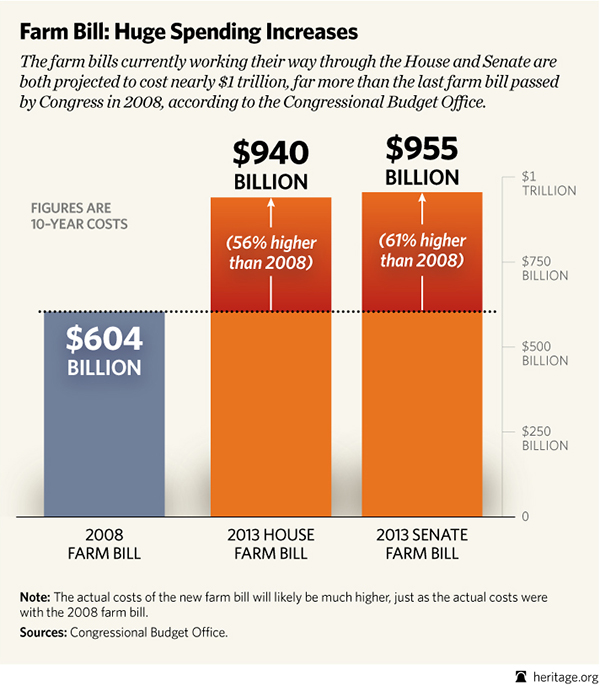The politics of the now completely unnecessary and economically damaging raft of oh-so-generous subsidies, payouts, and programs that the federal government affords the agriculture industry became self-perpetuating long ago, and most unfortunately, neither the Senate-passed version of the current farm bill nor the one sitting before the House are any exception to that depressing and Depression-age rule.
Supporting lawmakers and lobbyists are big fans of keeping both agriculture programs and food-stamps wedded into a single omnibus package, the easier to preserve the non-transparent nature of the whole things and throw in as many special projects and porkish handouts that they possibly can. The agribusiness lobby has evolved into a formidably powerful association with more than its fair share of political influence, and its ability to unite both Democrats and Republicans in the defense of special interests is really quite impressive; and you know the feds themselves are on board, because the Agriculture Department would be far less Busy and Important without so much taxpayer money to redistribute.
Proponents of getting these farm bills passed in are quick to point out that they are going to “save” taxpayers money by cutting out ten or twenty billion or so dollars from the budget over a decade — out of, you know, the trillion the farm bill is going to be spending over that same decade. As the Heritage Foundation points out, this is all a lot of hemming and hawing over what is a much more expensive bill than the last go-around, plain and simple:
What’s more, a lot of the much-discussed projections of savings are based on scenarios that may-or-may not materialize; Congress is looking to slim down the practice of the federal government making direct payments to farmers, because “direct payments” just sounds bad, but they’re instead going to be expanding government subsidized crop insurance to support and safeguard farmers’ incomes. It’s more of a kind of a six-of-one, half-dozen-of-another readjustment than it is a real, substantive reform, and plenty of highly niche interests are going to benefit from it as well as the many other special programs in the bills. As the WSJ points out, peanut, cotton, and sticky-rice farmers are going to be some of the big winners of the price guarantees in the bill:
The federal subsidy in the House bill guarantees farmers of Japonica Rice that if market prices drop below 115% of the average price of all types of rice, they will get a government payment to make up the difference. …
The move shines a light on guarantees against drops in commodity prices that are in some ways replacing the much-maligned direct payments to farmers Congress is seeking to end. Subsidies for products such as corn, wheat and cotton cost taxpayers about $5 billion a year. Rice growers have received a total of more than $2.6 billion in subsidies since 1995, according to the Environmental Working Group…
The sticky-rice provision won strong support from, among others, two Northern California lawmakers from neighboring districts, according to congressional aides and people working with the rice industry: Freshman Republican Rep. Doug LaMalfa, a fourth-generation Japonica Rice farmer who sits on the House agriculture committee; and Democratic Rep. John Garamendi, a rancher and pear farmer.
Price guarantees, really? Heck, why don’t we just guarantee prices for gold, running shoes, and umbrellas, while we’re at it?
This behemoth and pork-filled bill is going to be directing a full decade’s worth of federal policy, but it’s going to fly on through under the radar to the tune of a trillion dollars paying for all kinds of miscellaneous programs, like expanding expanding broadband in rural communities and cleaning up the Chesapeake Bay; it’s nothing short of a raging party funded by the taxpayer’s dime, and everybody’s invited!









Join the conversation as a VIP Member